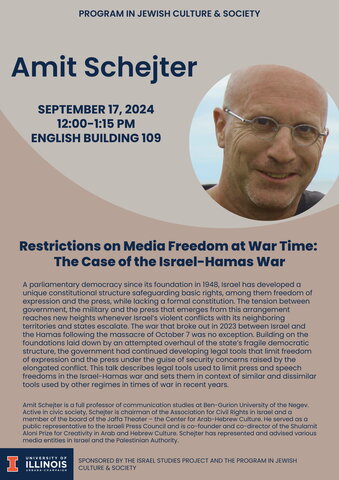
September 17, 2024
12:00-1:15 PM
English Building 109
A parliamentary democracy since its foundation in 1948, Israel has developed a unique constitutional structure safeguarding basic rights, among them freedom of expression and the press, while lacking a formal constitution. The tension between government, the military and the press that emerges from this arrangement reaches new heights whenever Israel's violent conflicts with its neighboring territories and states escalate. The war that broke out in 2023 between Israel and the Hamas following the massacre of October 7 was no exception. Building on the foundations laid down by an attempted overhaul of the state's fragile democratic structure, the government had continued developing legal tools that limit freedom of expression and the press under the guise of security concerns raised by the elongated conflict. This talk describes legal tools used to limit press and speech freedoms in the Israel-Hamas war and sets them in context of similar and dissimilar tools used by other regimes in times of war in recent years.
Amit Schejter is a full professor of communication studies at Ben-Gurion University of the Negev. Active in civic society, Schejter is chairman of the Association for Civil Rights in Israel and a member of the board of the Jaffa Theater - the Center for Arab-Hebrew Culture. He served as a public representative to the Israeli Press Council and is co-founder and co-director of the Shulamit Aloni Prize for Creativity in Arab and Hebrew Culture. Scheter has represented and advised various media entities in Israel and the Palestinian Authority.